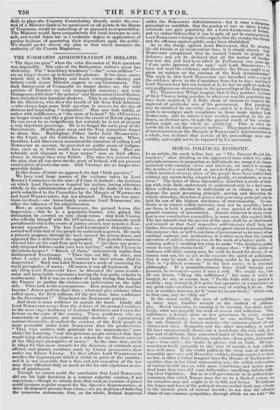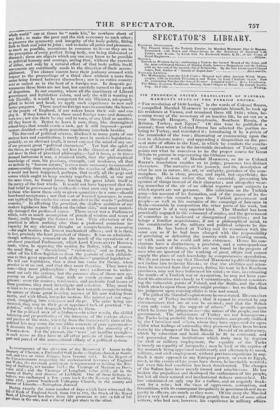MORAL POLITICAL ECONOMY.
IN an article, the week before last, on " The Present Social Dis. tractions," after dwelling on the aggravated form which the selfish principle assumes in proportion as individuals are merged in classes animated with common views and interests., we noted it amongst the results of' a semi-Liberal or pseudo-Liberal policy, "that the selfish instincts of every class of the people have been called forth without any means being adopted to gratify, to moderate, or to use them." The latter of these alternatives describes a mode of deal. ing with evils little understood, or understood only in a bad sense, Since selfishness, whether in individuals or in classes, is beyond dispute the great governing principle, moving and directing the wheels of society, therefore to govern that governing principle maybe held for one of the highest attributes of statesmanship. To era• dictate or to repress selfish instincts, may not be possible ; but to use them, is both a possibility and a rare species of thrift in the general economy of government. Almost whatever is most excel- lent in our constitution exemplifies, in some sort, this capital thrift. The law intends that the powers of' the state shall be so distributed and related as that their respective self-interests shall help, not hinder, the common good : and to a very great extent it accomplishes this purpose ; for, as well in our form of government as in many of our national customs and institutions, it is often seen that the natural operation of selfish motives can do the work of a better spirit. A cunning policy !—nothing less than to make "time drudging goblin sweat to earn his cream-bowl." It argues thus : " If the spirits of darkness will abide among men, let work be found for them ; if we cannot cast out, let us yet so flu. exorcise the spirit of selfishness, that it may be made to do something useful in its generation." This is " political economy" in the best sense ; it is practical philosophy. If a mountain-torrent force itself through your grounds, be revenged—make it turn a mill. We would say, with all our hearts, " Hong this selfishness ;" but since it won't be hanged, we say, as second best, " To the hulks with it ; punishit usefully ; nay, reward it, if it prove but operative or cooperative to any good end,—as there is ever sonic way of setting it to do. One way or another, however, let it "earn its cream-bowl ;" which even, in that case, may be "duly set." In the moral world, the uses of selfishness are exemplified in many ways, familiar enough to the student Of philoso- phy. Social necessity, in turning it to account, hiss done, intm- tively, what was properly the work of reason and reflection. This selfishness, a feature more or less prominent in every system of moral philosophy, is, according to one, nothing less than the sole finintain of human actions—time common parent of our virtues and vices. Sympathy and the other necessities of social life have unconsciously drawn mat a good from the evil, and, by a fine sort of alchemy, have converted much of' this base metal into gold; extracting from jealousy, emulation—from pride, independ- ence—from vanity, the desire to please, and so forth. Di:inte- restedness itself; agreeably to this view of morals, is but selfish- ness well used. In the world political, the same sort of alchemy insensibly goes on ; and Necessity—which, though reputed to have no law, is often a better lawgiver than the houses of Parliament modifies also, in her blind unreasoning way, the selfish animosities of various hostile classes, with more consistency and better prac- tical issue than ever did your deliberative, argufying, infinite-talk- ing elect legislators. liut as in self-government so in political go- vernment, Butt which Nature does for us to a limited extent, we for ourselves may and ought to do in full, and better. To balance the hopes and fears of the political classes so that both may vibrate to the nearest pitch of mutual accord ; to see that the electric chain of our common sympathies, through which we are told " the
world" can at times be " made kin," be nowhere short of whole
any link ; to make the poor and the rich necessary to each other ; to preserve the sympetry and integrity of the body politic, fitting limb to limb and joint to joint ; and to make all pains and pleasures, as much as possible, sensations m common to it—as they are to the perception of every perfect living body, not being dislocated or diseased; tltese are objects which any one may know to be possible to political honesty and courage, seeing that, without the exercise of either, and only by a natural effort of that bodv politic itself; movetuents are continually made in the direction of their accom- plishment. Two classes cannot have their jealousy aroused with respect to the proceediugs of a third class without a more firm
ion • being formed between themselves ; nor is an entire country un ,
ever so united as in the heat of a foreign war. In despotic go- vernments these hints are not lost, but carefully turned to the profit of despotism. In our country, where all the machinery of Liberal government and legislation exists, and only the will is wanting to rule liberally, it would be competent for any Minister, adequately gifted in heart and bead, to apply such experience to new and better purposes. There need no fbrei!ni wars to associate the hearts of the people of England, if our rulers know their 7•Sik and can play it. If they know it not, there need foreign wars and domestic WItTS too ; nor can there be any end to wars, of one kind or another, till they know it. Better to learn it now, than, like shortsighted school-boys that would evade a task, get it still imposcd—perad- venture doubled—with gratuitous vapid:dory interlude besides.
This fine end of political science, disclosed in many parts of our ancient laws and constitution, is rarely seen in modern legislation; robably, as an abstract truth, it never entered the mind of any one
of our present great "political characters." Yet had the spirit of the times, as regards politics, set less in the direction of doctrine and more in that of practical philosophy,—hal it been, as in times deemed barbarous it was, a received truth, that. the philosophical knowledge of man, his passions, strength, and weakness, all that we include by "human nature," it even more necessary to successfid statesmanship than acquaintance with the routine of official life,— it would not have happened, perhaps, that nearly all the pegs and screws which ought to keep society together, should, at one and the same time, be found loose leaving the great fabric itself at tlm mercy of the fins winds. ft would not have happened that the fatal belief in government by arillwo.lic—that men may be governed by those who know them only as given quantities in a sum—should hltvefound acceptance ; nor that sort of learned ignorance, in some sort typified by the exclusive sense at t ach eel to the words " political economy." In affecting the practical, the shallow ambition of our modern legislators has " thllen on the other side," and most materi- ally damaged the professed cause. There never was a Parliament which, with so much assumption of practical wisdom and scorn of theory, really brought the former so low. This affectation of the practical is often nothing else than a profound conscious in- capacity for any elevated thought or comprehensive reasoning —lbr aught besides the lowest mechanical offices ; and it is then, infect, precisely the least practical of things. It was an admirable, though unforeseen, comment on the result of the operations of a soi-disunt practical Parliament, which Lord CROTCH ETTY Howieis made, when, in opposing. the motion for Ballot, with, of course, the usual fling at " theosicians," " visionaries," and so forth, he called oil' his fellow-legislators from the pursuit. of such childish- ness to that great appointed task of theirs—" practical legislation." We tell our legislators, that a time has come for theory, when practice is at an end, and that they must theorize. They must do more—they must philosophize : they nma endeavour to under- stand not only the actions, but the passions also, of those now ap- pearing on the political stage with so much gesture and wild
grimace: even the sources, tendencies, and probable final issues of those passions, they must investigate and consider. They must be
so kind as to comprehend, or do their best towards comprehending, the nature of those great heaving masses of life now waking from inertia, and with blind, irreg!:lar motion, like matter yet not orga- nized, struggling into exis:Lilee and slimie. The same being un- derstood, they may to their goat appointed task of practical "le- gislation," with what despatch belongs to them. For the political uses of scIdsbness—in other words, the skilful balancing and proportionib, of the interests a the various classes
and parties of the state, Ivhereby from the in tints of the
Political his may come the one white concrete of pure agreement— it demands the sagacity of a .?.l.‘cnt.% vim with the sincerity of it WASIIIN(:ToN. For the present, the " uses" tire tinniliar enough— in such set se as they have at rill caller periods of time been—as part and parcel of the conventional villany of a political system.



























 Previous page
Previous page